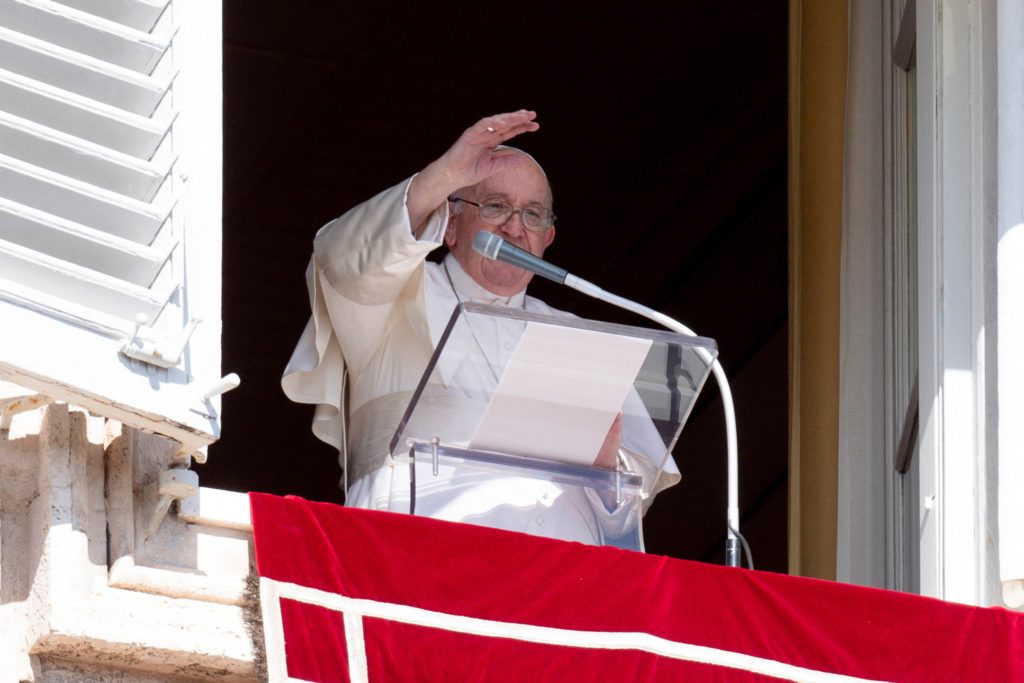The best medicine for a weary soul is prayer, Pope Francis said Sunday with a reminder that like many medical treatments, consistency is key.
“We often focus on so many urgent but unnecessary things. We occupy and preoccupy ourselves with so many secondary realities. And perhaps without even recognizing it, we neglect what counts the most and we allow our love for God to grow cold, to grow cold bit by bit,” Pope Francis said on Oct. 16.
“Today, Jesus offers us the remedy to rekindle a tepid faith. And what is the remedy? Prayer. Yes, prayer is the medicine for faith, it is the restorative of the soul.”
Speaking from the window of the Apostolic Palace, the pope said in his Angelus address that consistent daily prayer can heal the soul like medicine heals the body when taken “regularly in the right way and at the right times.”
“Let us think of a houseplant: we need to water it consistently every day. We cannot soak it and then leave it without giving it water for a week! Even more so with prayer,” he said.
“We cannot live only on strong moments of prayer or occasional intense encounters … We need the daily water of prayer, we need time dedicated to God, so that he can enter into our time, into our lives.”
Pope Francis said that it is in these consistent daily moments of prayer that “we open our hearts to him so that he can daily pour out on us love, peace, joy, strength, hope, thus nourishing our faith.”
Reflecting on Jesus’ instruction in chapter 18 of the Gospel of Luke to “pray always,” the pope suggested a traditional spiritual practice that “is a bit forgotten today.”
Aspirations, or short easy to memorize prayers that can be repeated often, can help one to stay “in tune” with God throughout the day, Pope Francis said.
“For example, as soon as we awaken, we can say: ‘Lord, I thank you and I offer this day to you.’ This is a short prayer. Then, before an activity, we can repeat, ‘Come, Holy Spirit.’ Between one thing and another, we can pray thus, ‘Jesus, I trust in you. Jesus, I love you,’” the pope suggested.
“How often we send instant messages to the people we love! Let’s do this with the Lord as well so that our hearts remain connected to him,” he added.
At the end of his Angelus address, the pope announced his decision to extend the Synod on Synodality to 2024 “in order to have a more relaxed period of discernment."
The pope also offered thanks for the beatification of Blessed Giuseppe Bernardi and Blessed Mario Ghibaudo, Italian priests who were killed by the Nazis in World War II.
“In extreme danger, they did not abandon the people entrusted to them but assisted them even to the point of shedding their blood, sharing the tragic destiny of other fellow townspeople killed by the Nazis. May their example enkindle in priests the desire to be pastors after Christ’s heart, always alongside their people,” he said.
Pope Francis highlighted an initiative by Aid to the Church in Need to have one million children pray the rosary on Oct. 18 and urged everyone to unite the prayers with these children.
“Let us unite ourselves to them and entrust the suffering people of Ukraine, and other people who are suffering due to war and any form of violence and misery, to Our Lady’s intercession,” he said.

